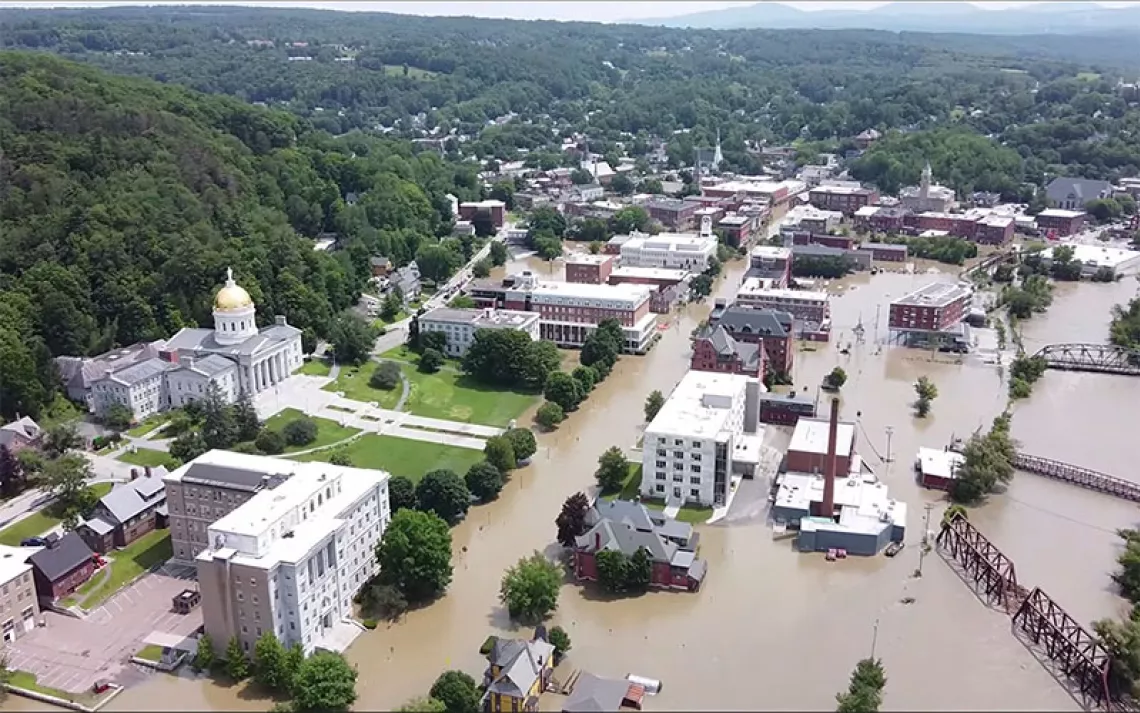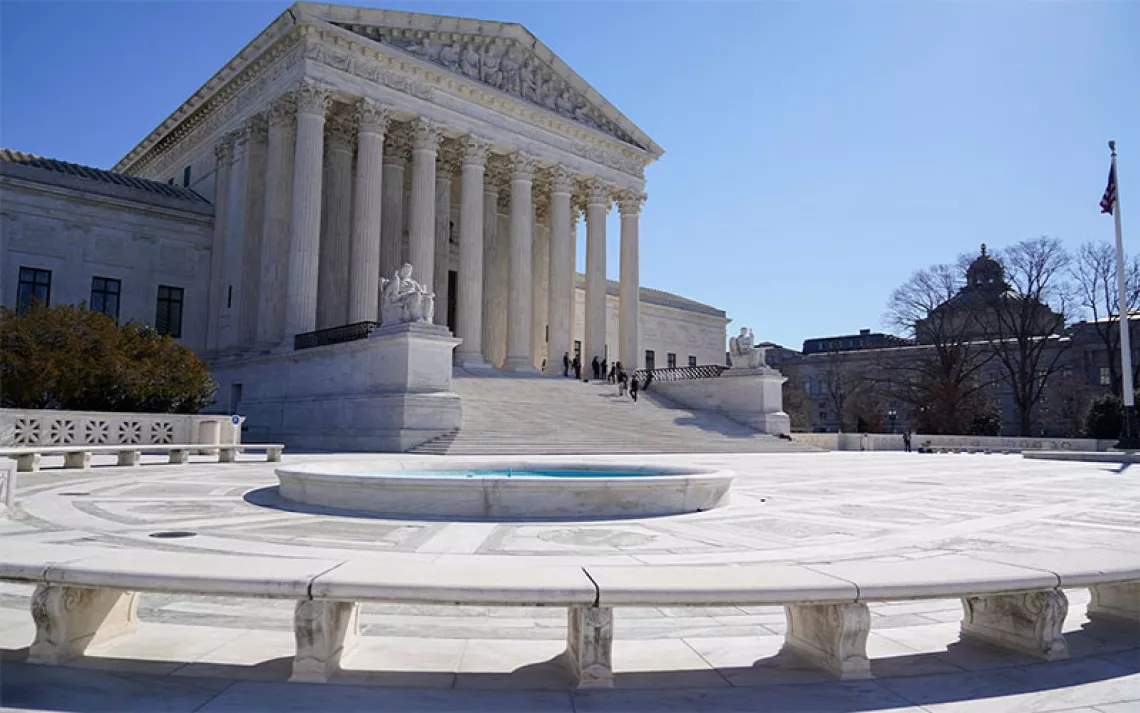Trump's NEPA Rollback Favors More Pollution and Less Community Input
The move would significantly weaken the law

Donald Trump arrives to speak at an event at the UPS Hapeville Airport Hub on July 15, 2020, in Atlanta. | Photo by AP Photo/Evan Vucci
This week, Donald Trump announced one of the biggest rollbacks of established environmental law in a generation, declaring in a speech in Atlanta that his administration was moving forward with a fundamental overhaul of the 50-year-old National Environmental Policy Act (NEPA).
"I've been wanting to do this from day one,” Trump said during his speech at the UPS airport hub in Atlanta. “And we started this on day one.”
For five decades, NEPA has been the primary tool for US communities to learn about and influence infrastructure projects—like power plants, highways, and pipelines—that might affect them. NEPA guaranteed citizens information about the environmental and public health impacts of those projects: directly, indirectly, and cumulatively over time. Concerned parties could engage in a public review and comment process that could, and often did, lead to significant modifications to proposed projects to minimize their environmental harm. Finally, it let the public hold the government and third parties accountable should they fail to comply with NEPA regulations.
Trump’s overhaul of NEPA reverses those protections and processes. If it survives the expected legal challenges, it will undo 50 years of NEPA precedent and interpretations by federal agencies and the courts and make it much more difficult for communities burdened by pollution or worried about climate change to push back on destructive projects.
“Less projects will now go through environmental review, and when an environmental review is performed, many impacts will be excluded from discussion, consideration, and public knowledge,” Caitlin McCoy, a fellow for the Environmental and Energy Law Program at Harvard University, told Sierra. “We will not have a full accounting of the impacts of these projects, how they will affect our health, environment, and communities.”
NEPA has been one of the nation’s bedrock environmental laws since President Richard Nixon signed the legislation in 1970. The law established a series of parameters by which federal agencies can evaluate infrastructure projects such as pipelines and power plants for their environmental impacts, and mandates a public disclosure process to create transparency around those impacts to guarantee reasoned, and publicly informed, decision-making as to whether they are safe to proceed.
Under the NEPA revisions announced this week, federal agencies can no longer evaluate the “cumulative” effects of projects—such as their impact on climate change—or how multiple projects collectively affect a community. A new refinery seeking to move into a community with several existent refineries, for example, would only be evaluated based on its own impact, not the cumulative impact of the multiple refineries.
“That’s a problem, because real people have to deal with the cumulative environmental impacts of industrial development, whether that’s air pollution, water pollution, or climate pollution,” said Nathaniel Shoaff, a senior attorney with the Sierra Club’s Environmental Law Program. “Those cumulative impacts are now totally removed from NEPA.”
The elimination of cumulative impacts also voids the requirement that climate change be considered when reviewing the environmental impact of a refinery, power plant, or highway.
In the past, projects could be evaluated for their impact on the environment in the future, such as on climate change. When projects emit greenhouse gases like carbon dioxide and methane, those gases build up in the atmosphere over time and cause damage over time. Under the new regulations, impacts that occur either later in time or are geographically removed in distance from the project may no longer be considered.
“Climate change is a tremendous and breathtaking threat to our planet and our lives,” McCoy said. “There is almost no deeper irony than the fact that these changes to our foundational environmental statute are laser focused on excluding climate impacts from environmental review. And it’s happening now during a global pandemic, which seems to be more deadly if you breathe polluted air, when we’re reckoning with racial justice, and at a time when the climate crisis is accelerating.”
The Trump administration’s new regulations will also make it far more onerous and expensive for communities to challenge a project under NEPA, establishing a hard deadline of two years to complete environmental assessments, and recommending that a bond be posted to cover the cost of any project delays as a result of the challenge. Community groups looking to challenge a multibillion-dollar gas pipeline might now have to put up thousands or even millions of dollars to fight that project through a NEPA review. The new regulations also appear to call for a less democratic public comment process—they call for commenters to "rely on their own comments and not those submitted by other commenters in any subsequent litigation," which would limit someone challenging a project in a lawsuit to raising only the concerns that they specifically put in their own individual public comment.
Trump’s NEPA rewrite even changes the definition of “effects.” Previously, those had included both direct and indirect effects. Now, a review under NEPA need only consider effects with a “reasonably close causal relationship to the proposed action.” In addition, the definition of “major federal action” is modified to exclude projects with minimal federal funding or involvement, thus significantly narrowing what projects qualify for a NEPA review, though no specific number was offered to clarify what “minimal federal funding" means.
A major beneficiary of these changes is the fossil fuel industry, which has been angling for a NEPA overhaul since Trump took power. The burning of fossil fuels such as coal, oil, and fracked gas produces over two-thirds of total greenhouse gas emissions. Late last year, more than 30 industry groups, including the American Petroleum Institute, signed on to a letter to the White House Council on Environmental Quality, the agency that oversees the implementation of NEPA, to “modernize” NEPA regulations.
The administration’s move on NEPA follows a series of recent defeats for its campaign to fast-track fossil fuel infrastructure projects like oil and fracked gas pipelines. For many of these projects, the administration was trying to move forward without taking the time to conduct a robust environmental impact review or to consult with local communities. In ruling against the Dakota Access and Keystone XL Pipelines, for example, two federal courts ruled that the administration failed to conduct a serious review of the impact on the environment and endangered species.
“This is a clear giveaway to the fossil fuel industry,” Shoaff said. “Almost all of the procedural safeguards that are part of NEPA were found in the regulations. This squashes the majority of them. Because of these changes, the low-income communities of color that are disproportionality affected by refiners and pipelines and the siting of fossil fuel projects are going to lose a voice.”
 The Magazine of The Sierra Club
The Magazine of The Sierra Club







